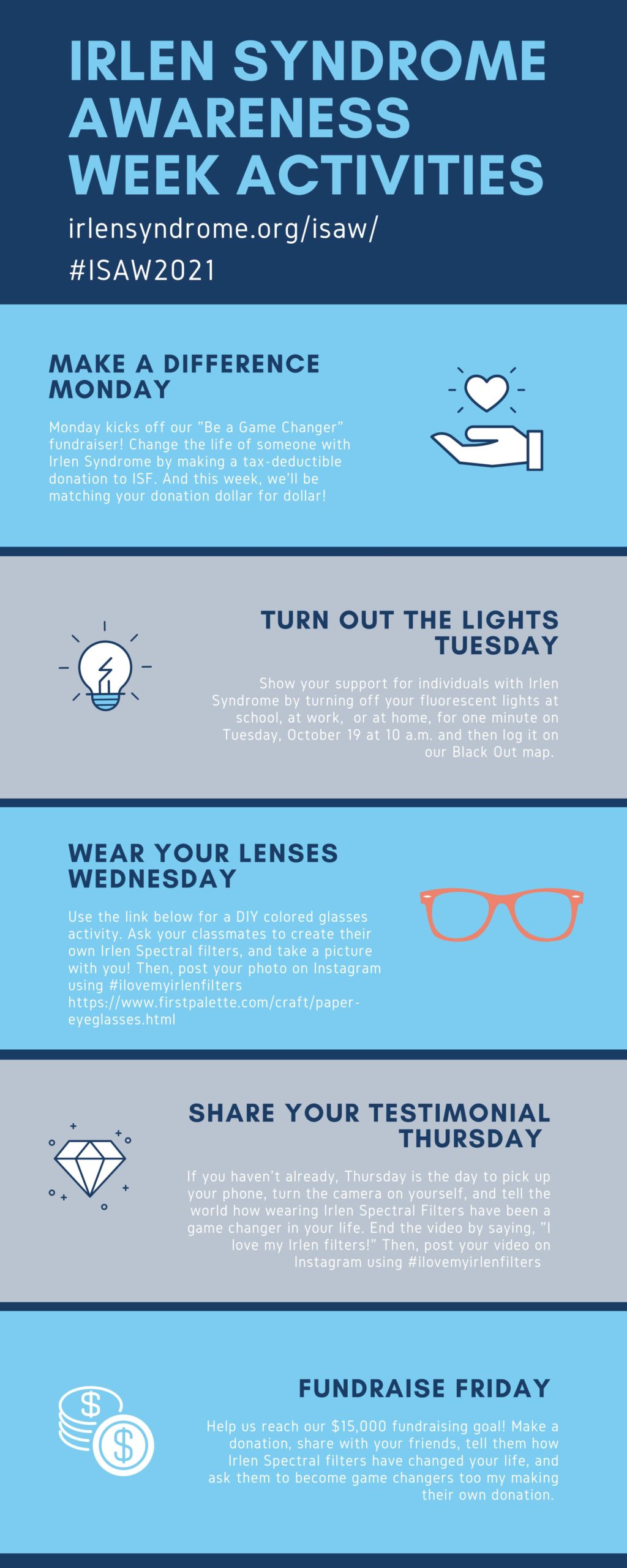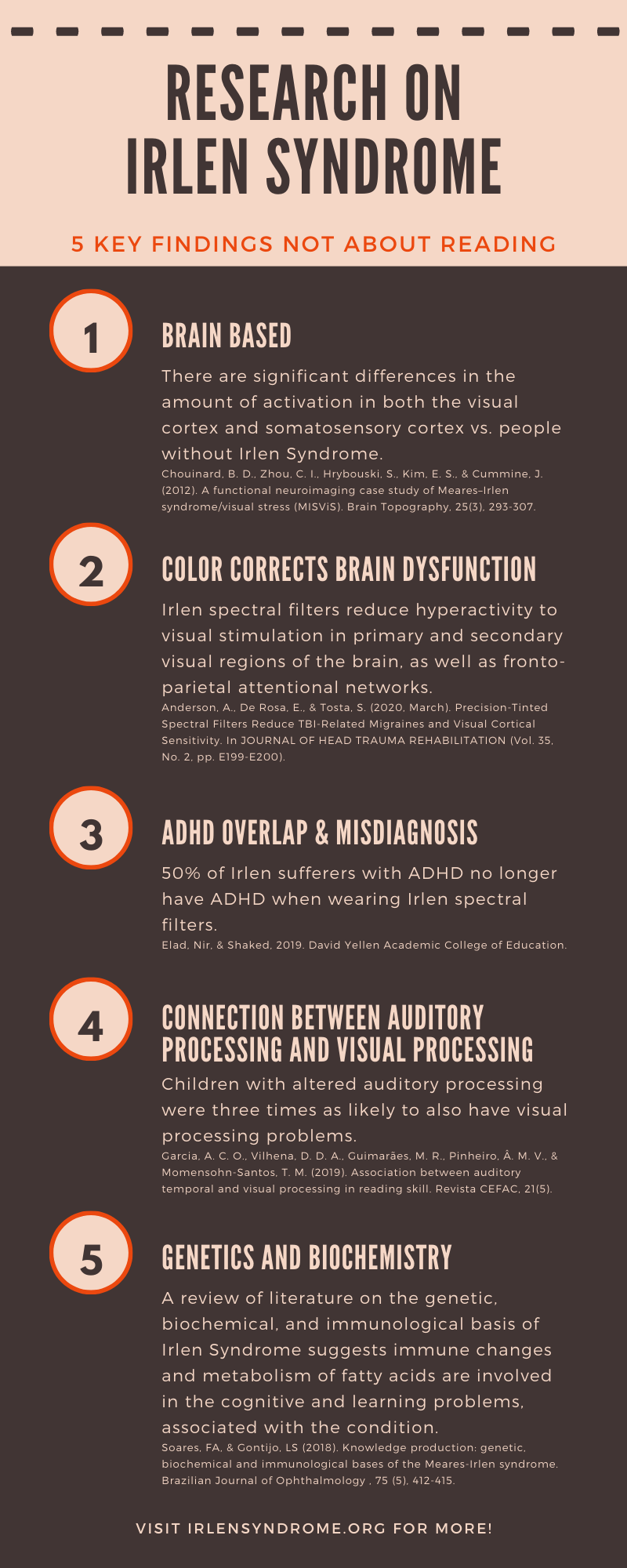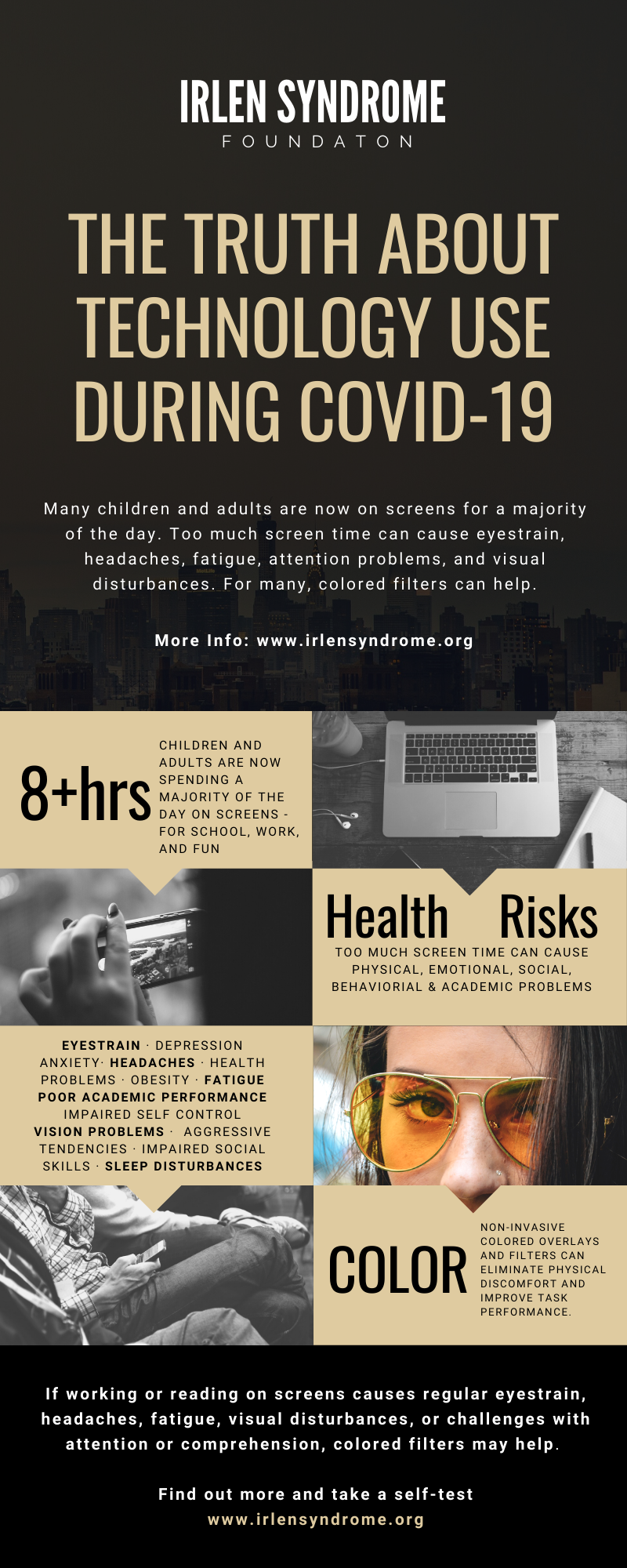Irlen Syndrome and Scotopic Sensitivity: Symptoms, Eye Stress, and Visual Strain
Understanding Irlen Syndrome and Scotopic Sensitivity is crucial for recognizing symptoms related to visual stress and strain. These conditions, often overlooked in standard vision screenings, can greatly impact reading, learning, and daily functioning. By unpacking the intricacies of heightened light sensitivity, and the stress it places on the eyes, this article aims to shed light on the frequently misunderstood symptoms that individuals with Irlen Syndrome and Scotopic Sensitivity experience. At Irlen.com, we provide insights into diagnosis and strategies designed to alleviate the discomfort associated with these visual processing difficulties.
Irlen Syndrome: Understanding Symptoms and Visual Stress
Irlen Syndrome, also known as scotopic sensitivity syndrome, is a visual ailment that causes difficulty when it comes to reading and properly perceiving printed text. Individuals with this condition often experience significant visual stress, leading to symptoms such as eyes that hurt, headaches, and an increased propensity for one’s eyes to become watery or for discomfort to occur while reading. Additionally, those affected may find themselves dealing with eye strain even during non-reading activities, suggesting a broader sensitivity to certain types of light. This sensitivity does not typically improve with traditional vision correction methods such as glasses or contact lenses, as the syndrome isn’t due to a problem with the eyes’ ability to focus, but rather how visual information is processed by the brain.
The syndrome’s link with light means that individuals may manifest a unique set of visual problems under various lighting conditions. For instance, bright fluorescents or harsh outdoor light can exacerbate the syndrome, causing the vision to become less efficient and focused, compelling those affected to seek dimmer or more controlled lighting environments. Moreover, the repetitive patterns found in certain texts can cause a type of visual echo or blurring, which only furthers the strain.
Recognizing the symptoms of Irlen Syndrome is crucial because it allows for more understanding and management of the discomfort and challenges it brings. Individuals might notice that they experience headaches more frequently when engaged in visual tasks, or that their eyes hurt after short periods of reading. Often, these symptoms are misattributed to the need for vision perscription adjustment or presumed eye fatigue. However, proper diagnosis is essential to receive the correct intervention, which might include the use of color-tinted filters or overlays that can reduce the visual stress associated with Irlen Syndrome.
It’s pertinent to remember that scotopic sensitivity syndrome doesn’t only affect reading abilities. The broader spectrum of life experiences, from the glare of a computer screen to the flicker of fluorescent lights, can also elicit the symptoms associated with the syndrome, emphasizing the need for awareness and comprehensive care strategies for those impacted by this visual condition.
- Difficulty with reading, such as rapid fatigue, discomfort, or an inability to comprehend written text
- Sensitivity to bright lighting or glare, often leading to headaches or strain on the eyes
- Visual distortions, including blurring, halos around text, or apparent movement of words on a page
Identifying the Visual and Eye Strain Symptoms Associated with Irlen Syndrome
Irlen Syndrome, also known as Scotopic Sensitivity Syndrome, is a perceptual processing disorder that can lead to significant visual strain and a variety of other debilitating eye-related symptoms. Individuals with this syndrome may find concentrating on text nearly impossible, as words seem to merge or dance on the page, provoking considerable discomfort while reading. This can include vision problems such as eyes becoming watery or experiencing dry eye, which are common complaints. Furthermore, a pronounced sensitivity to light often manifests in those suffering from Irlen Syndrome, making everyday environments feel overwhelmingly bright or glary.
The symptoms of Irlen Syndrome extend beyond mere visual strain; individuals may report recurring headaches and a difficulty maintaining focus, particularly when engaged in intensive reading tasks. This struggle stems from the unique visual perception challenges intrinsic to the syndrome. Even the words on a page can appear distorted, causing strain and leading to problems with fluency, comprehension, and sustained attention during reading activities. The visual stress incurred can turn reading into a strenuous, rather than an enjoyable, experience.
Undiagnosed individuals might find that their eyes hurt without understanding why, or they may realize that the page’s consistent and unrelenting glare intensifies their visual strain. This discomfort can be misattributed to other eye conditions, underscoring the importance of proper identification and support from professionals familiar with Irlen Syndrome. When it comes to pinpointing and addressing the perception pains associated with this condition, an Irlen.com-certified diagnostician can help individuals better understand the visual and perceptual problems they face.
Thankfully, with heightened awareness and appropriate interventions tailored to their visual perception variations, those challenged by Irlen Syndrome can find relief from eye strain and the associated symptoms. Once identified, strategies and resources provided by Irlen.com could substantially mitigate the impact of the syndrome on an individual’s capacity to read and function in light-sensitive situations, thereby improving their overall quality of life.
Processing Disorder’s Impact on Individuals and the Irlen Test for Diagnosis
Irlen Syndrome, identified as a processing disorder, is distinguished by its profound effects on individuals’ visual perception problems. Symptoms associated with this syndrome can extend beyond mere eye stress; they often resonate through one’s ability to process visual information, chiefly due to scotopic sensitivity. This brain processing challenge significantly impacts reading and comprehension, hindering academic and occupational performance. Consequently, accurate diagnosis of Irlen Syndrome is paramount. The Irlen test, a specialized exam, effectively measures the severity of this syndrome and the extent of visual stress suffered.
This neural anomaly, often confused with dyslexia, warrants a distinction that ongoing research continues to elucidate. Both disorders can exhibit similar characteristics, such as difficulties with reading, but they stem from different causes. It is this specific nature of Irlen Syndrome that underscores the importance of proper diagnosis and differentiating it from purely dyslexic patterns. Treatment options, such as customized lenses or glasses, can notably alleviate symptoms, thus reinforcing the value of targeted intervention.
For those seeking advice for managing symptoms, understanding the correlation between Irlen Syndrome and related conditions like autism is beneficial. The disorder’s impact extends to other realms of neural development disorders, making it a subject of intricate research within the brain science community. As an Irlen-certified diagnostician, one can attest that the Meares-Irlen Syndrome—another name for Irlen Syndrome—exhibits a spectrum of intensity in visual tension and processing inaccuracies.
Incorporating the spectral filters or glasses designed to address these visual perception challenges, individuals have reported significant improvement in their ability to focus and process information visually. It’s this evidence that propels Irlen.com to advocate for greater recognition and understanding of the syndrome and its effects. Parents, educators, and healthcare providers are encouraged to consider the signs of Irlen Syndrome in their assessments of visual and brain function anomalies. With further research and development, the management of Irlen Syndrome will continue to evolve, offering those affected a path to improved visual processing and a better quality of life.
In conclusion, Irlen Syndrome and Scotopic Sensitivity can significantly impact an individual’s daily activities through a variety of symptoms, including eye stress and visual strain. Understanding these signs is essential for seeking a proper diagnosis and effective intervention. As Irlen-certified diagnosticians, we at Irlen.com are dedicated to providing comprehensive assessments and tailored solutions to alleviate the challenges associated with these conditions. Awareness and appropriate support are key to improving the quality of life for those affected by Irlen Syndrome and Scotopic Sensitivity.
Q: What is Irlen Syndrome and how does it affect reading and daily functioning?
A: Irlen Syndrome, also referred to as Scotopic Sensitivity Syndrome, is a visual processing disorder that leads to significant visual strain and discomfort when reading or performing daily activities. Individuals with this syndrome may experience symptoms such as headaches, eye pain, and a propensity for watery or uncomfortable eyes while reading. These symptoms result from the brain’s difficulty in processing visual information, not from the eyes’ ability to focus.
Q: Are the symptoms of Irlen Syndrome limited only to reading tasks?
A: No, the symptoms of Irlen Syndrome extend beyond reading. Sufferers may experience eye strain and other symptoms, such as headaches and difficulty maintaining focus, in various light-sensitive situations. This includes everyday activities such as looking at a computer screen, being under fluorescent lighting, or being outside in bright light.
Q: How can Irlen Syndrome be differentiated from other visual or reading difficulties?
A: Irlen Syndrome is characterized by specific symptoms like visual stress, sensitivity to certain types of light, and problems with seeing text clearly. It is distinct from dyslexia, which is primarily a learning disorder affecting reading abilities, though both can have similar reading difficulty symptoms. A comprehensive Irlen test conducted by a certified diagnostician is key to distinguishing Irlen Syndrome from other conditions.
Q: What types of interventions are available for individuals with Irlen Syndrome?
A: Appropriate interventions for Irlen Syndrome may include the use of color-tinted filters or overlays that help reduce visual stress. Customized lenses or glasses specifically designed for the individual can also significantly alleviate symptoms. These solutions are aimed at enhancing visual processing by the brain rather than correcting eyesight issues.
Q: Where can individuals or healthcare providers seek professional diagnosis and support for Irlen Syndrome?
A: Professional diagnosis and support for Irlen Syndrome can be obtained through Irlen.com, where certified diagnosticians provide comprehensive assessments to identify the syndrome. Irlen.com also offers tailored solutions and strategies designed to alleviate the discomfort associated with visual processing difficulties inherent in the syndrome.
Please note, the answers to these FAQs are drafted to provide general information. For specific medical advice, diagnosis, or treatment, individuals should contact a healthcare professional or a certified Irlen diagnostician.


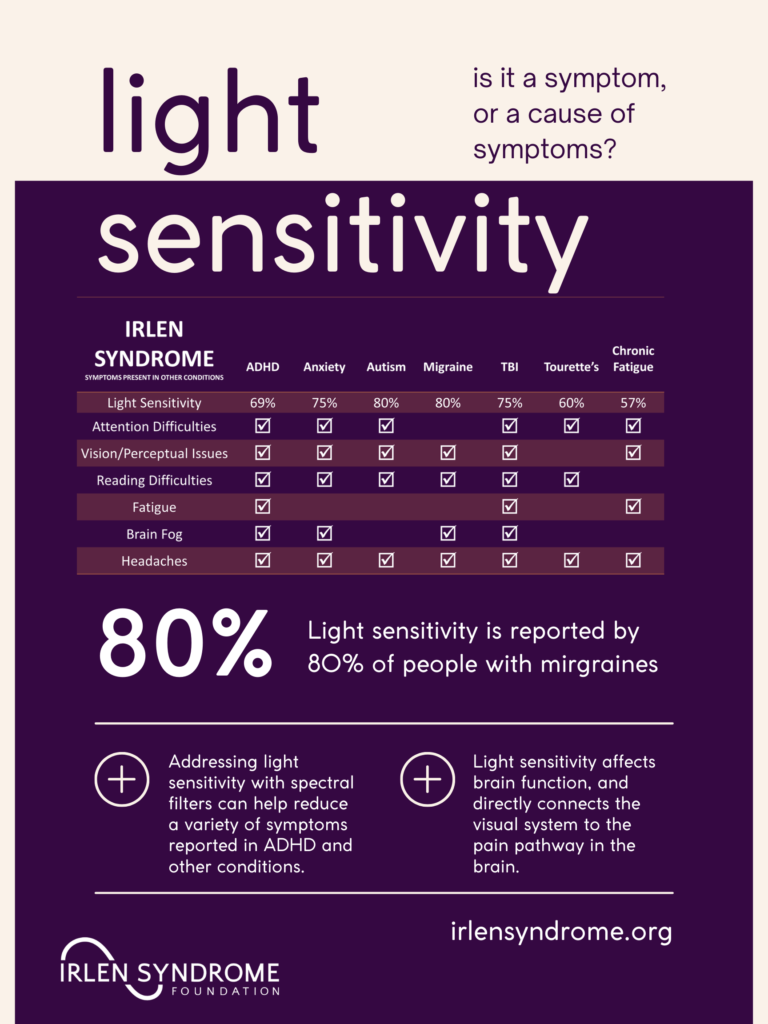
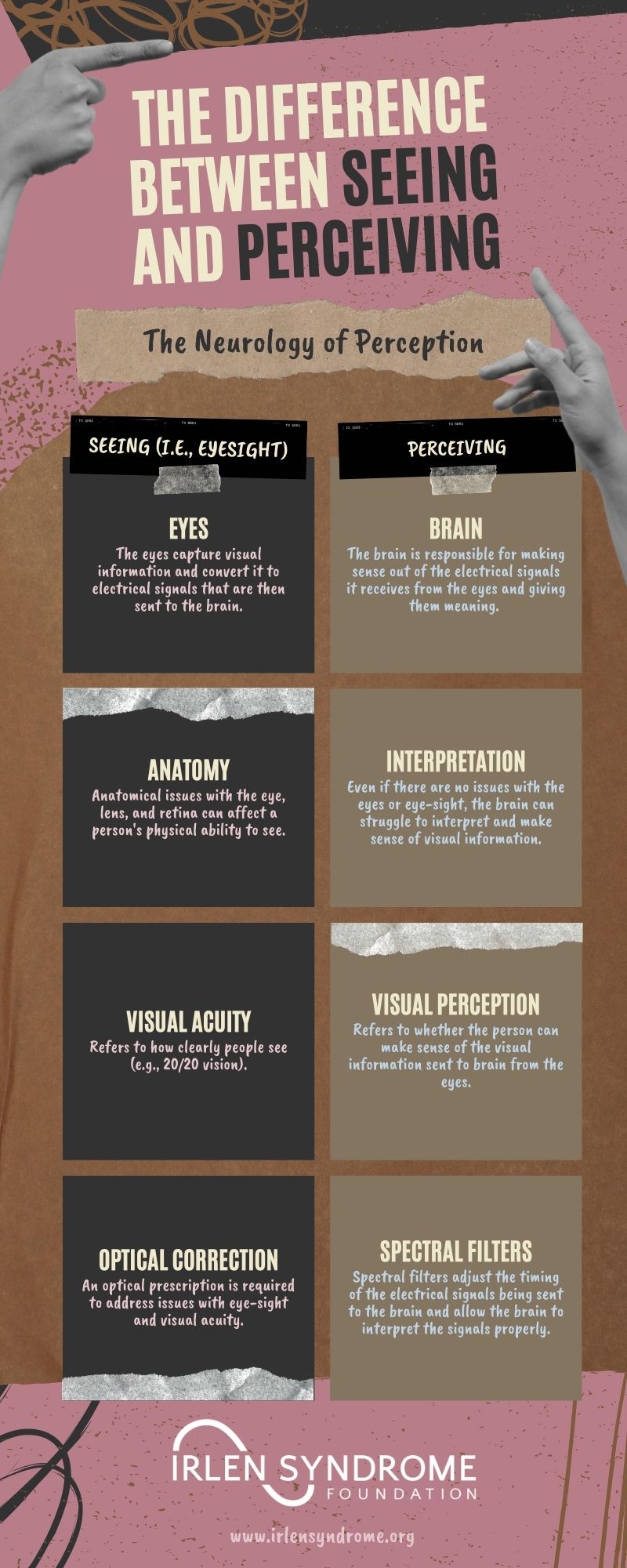
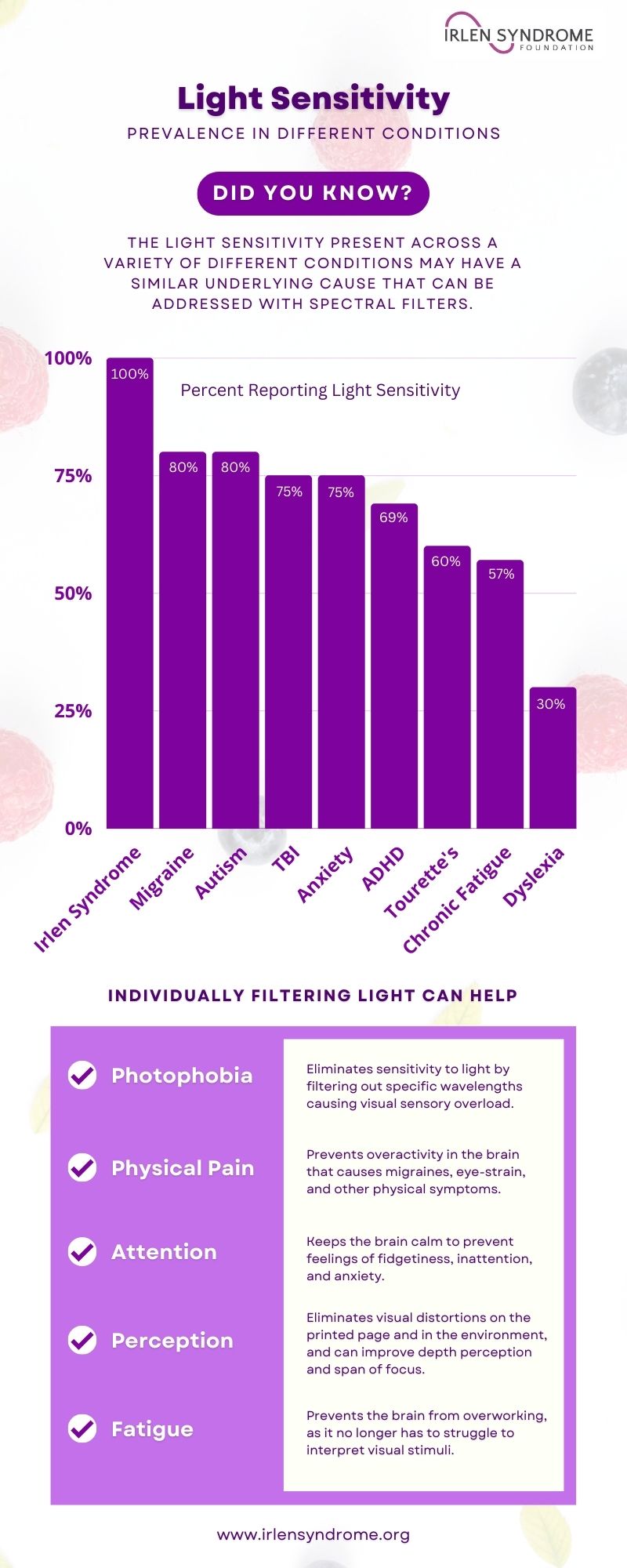
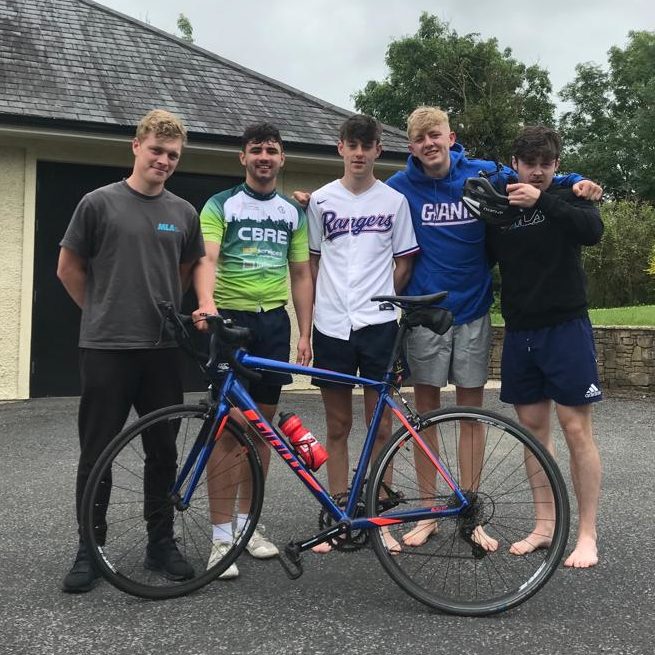 My mom discussed the Educational psychologist’s report with Mrs. Hogan who agreed that we needed a change in direction in dealing with my issues. She put us in touch with a new speech and language therapist who recommended that I meet with Karen O’Connor who runs the ‘Child Development Centre’ in Ireland. This center runs programs for children with a wide range of issues. We did not know it at the time, but this program was going to drastically improve my school and social life. I vividly remember the first time I stepped foot into the room where “The Lift” as it was known was run. I was in a group of 8 to 10 children who had experienced similar issues to me. This program, to explain it briefly, was a music therapy program that took place 5 days a week for 3 weeks. Each child was given a microphone headset and any book of interest. For 20 to 30 minutes, each child would take a spot in a room by themselves and read aloud while listening to classical music, and as you read, you can hear yourself through the microphone.
My mom discussed the Educational psychologist’s report with Mrs. Hogan who agreed that we needed a change in direction in dealing with my issues. She put us in touch with a new speech and language therapist who recommended that I meet with Karen O’Connor who runs the ‘Child Development Centre’ in Ireland. This center runs programs for children with a wide range of issues. We did not know it at the time, but this program was going to drastically improve my school and social life. I vividly remember the first time I stepped foot into the room where “The Lift” as it was known was run. I was in a group of 8 to 10 children who had experienced similar issues to me. This program, to explain it briefly, was a music therapy program that took place 5 days a week for 3 weeks. Each child was given a microphone headset and any book of interest. For 20 to 30 minutes, each child would take a spot in a room by themselves and read aloud while listening to classical music, and as you read, you can hear yourself through the microphone.